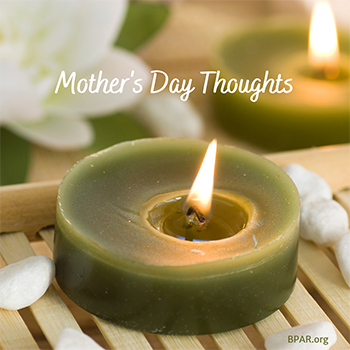Loss on Mother’s Day – How to Cope in the Post Adoption World
 Mother’s Day is often a loaded day for individuals in the adoption constellation. With the current pandemic, the weight of this day can be exacerbated. For individuals who have experienced loss, holidays like these (Mother’s Day, Siblings Day, Father’s Day, etc.) can be a reminder of that loss. Depending on where you are on our healing journey, this reaction can manifest in a variety of ways such as a subtle feeling of loss; joy when remembering positive times; anger; disappointment; or even a gut-wrenching pain that makes your body shut down or feel ill. And all of those reactions are okay and are normal. When it comes to loss, there are no guidelines or timelines for healing—the pain ebbs and flows, and at times it can feel unbearable.
Mother’s Day is often a loaded day for individuals in the adoption constellation. With the current pandemic, the weight of this day can be exacerbated. For individuals who have experienced loss, holidays like these (Mother’s Day, Siblings Day, Father’s Day, etc.) can be a reminder of that loss. Depending on where you are on our healing journey, this reaction can manifest in a variety of ways such as a subtle feeling of loss; joy when remembering positive times; anger; disappointment; or even a gut-wrenching pain that makes your body shut down or feel ill. And all of those reactions are okay and are normal. When it comes to loss, there are no guidelines or timelines for healing—the pain ebbs and flows, and at times it can feel unbearable.
Adoption Begins with a Loss
Adoption always begins with a loss. Adoptees lose their birth parents (among lots of other things). Birth parents lose their child and are often forced to cope alone as they may face judgment or feel shame or guilt about the placement of their child. Adoptive parents must grieve the loss of miscarriages, failed adoptions, or even the fantasy of what they thought their child might be like. Foster parents grieve the loss of children coming in and out of their home.
How to Cope with Loss
So now that we know a feeling of loss is normal … what is the best way to cope? How do we get through it? The first step is always to acknowledge and honor. Adoptive parents can focus on providing validation and normalizing their child’s feelings. Adoptees may not have the words to express how they feel, but their behaviors can definitely be indicative of their internal experience. Remind them that this day can be hard, that you are there for them if they want to talk. You could light a candle or plant something. For adoptees who don’t have contact with their birth mothers, this pandemic can also bring up fears of the unknown—does my birth mother have the COVID virus? Did she die? Will I ever be able to see her?
For adult adoptees, it’s equally as important to acknowledge and honor your feelings. Loss can show up as irritability, exhaustion, sadness, confusion, anxiety and dissociation. Feelings can show up physically as well, in the form of stomach pains, rashes, nausea, headaches, etc. If you find yourself feeling bad, pause a few minutes and tap into yourself. Do a body scan from toe to head and home in on how each part of you is feeling. Do you need to release tension? Do you need to take a nap? Do you need to call a friend and cry?
It’s Okay to Be Sad
The ways we can find comfort and cope with loss during the pandemic are different from the options we might normally have. We can’t turn to a lot of our go-tos like getting out of town, taking a trip, going to see live music, or even eating at our favorite restaurants. An altered version of these coping mechanisms might not bring us the respite that we are seeking. It’s okay to be disappointed, it’s okay to be sad, it’s okay to not know how to cope—just accepting this can be helpful. During these times, we need to turn to the basics of self-care: moving our bodies in a way that feels good, getting rest, eating nourishing food, drinking lots of water, and connecting with others. Another valuable tool is using gratitude. Sure, we can focus on what we don’t have—but if you can spend two minutes writing down what you do have, it can make a huge difference.
Our society struggles to tolerate pain and difficult emotions. We numb ourselves, are masters at avoidance, and bury our feelings deep down. At BPAR we believe in the power of acceptance and acknowledgement. We know that things aren’t always easy and that life can be very challenging. We want you to know that we recognize and see the pain that Mother’s Day can bring. We want you to know that you are not alone in this. We are here for you.
Written by Kelly DiBenedetto
Boston Post Adoption Resources